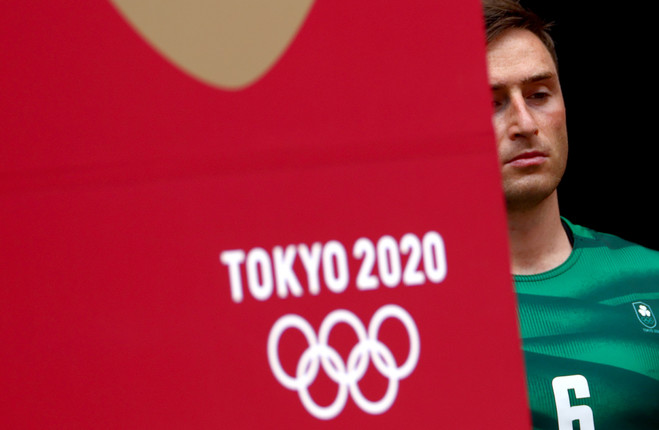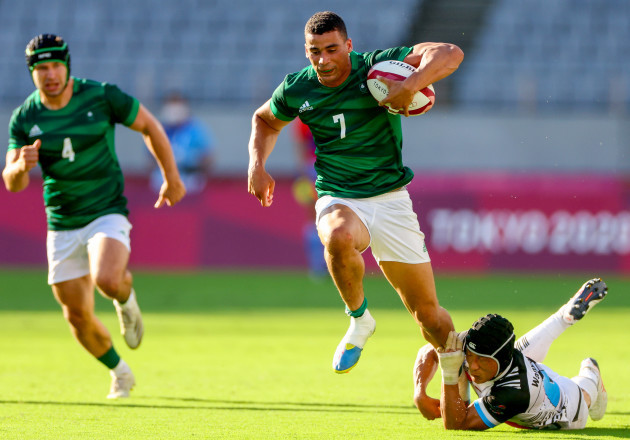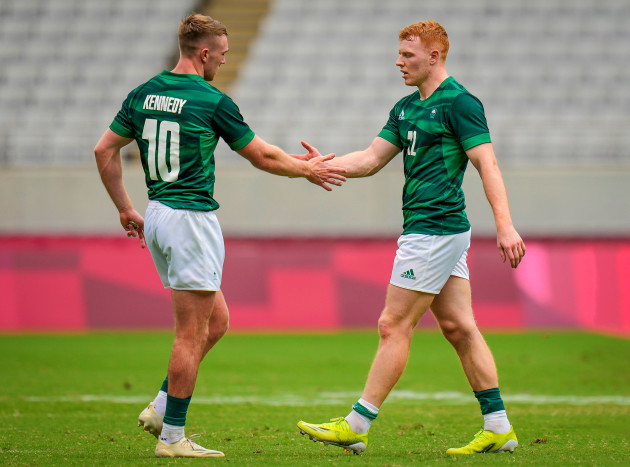ULTIMATELY, IRELAND 7S never had that moment that ignited their Olympics campaign, dragging in the kind of wider interest around Ireland that would have pushed the seven-man code to another level in the public consciousness.
To be fair, that already been achieved with Ireland’s qualification for Tokyo, which was undoubtedly an achievement and helped to raise awareness about a team that had battled from the bottom of European rugby in 2015 to the Games in 2021.
Billy Dardis and his team-mates have been clear about their disappointment at underperforming over the last three days. The odds were stacked against them with a tough pool draw against South Africa, the US, and Kenya but Ireland failed to fire at the level we know they’re capable of.
They did come within a minute of squeezing into a quarter-final spot but the harsh reality is that they probably didn’t deserve it. Anthony Eddy’s side have been a rising force in 7s in recent years, with their game built on a structured, solid, error-free style that allows Terry Kennedy to be the chief creator and Jordan Conroy the key finisher.
Their error count in Tokyo was too high and the Kennedy-Conroy combo didn’t feature enough to allow them to make an impact on the competition.
They travelled to the Games with medal ambitions so a 10th-place finish leaves them dejected. Hugo Lennox went as far as to say “we’re embarrassed, to be honest” but frustration is surely the feeling that will linger.
They will learn from this disappointment and we will see many of them them in action again on the 2021 World 7s Series, which is due to kick-off in Canada in September.
There is also a 7s World Cup to come next year in Cape Town, although Ireland still have to secure qualification. The next Olympics is only three years away and there’s no doubt that some of these Irish players will be eyeing Paris already.
In short, there are brighter days ahead and Ireland have shown in the very recent past that they can be competitive in 7s when they’re on their game.
But given that the Ireland women’s 7s team didn’t qualify, that’s it for Irish rugby at the current Olympics in Tokyo.
That’s not it for Irish 7s rugby at the Olympics in general, though.
It went under the radar last week but the IRFU underlined its commitment to the ‘Olympic rugby 7s pathway’ by stating its aim of having the men’s and women’s teams qualify for the 2024 Olympics in Paris and the 2028 Games in Los Angeles.
Furthermore, there is a new objective of having the Ireland U18 men’s and women’s 7s teams reach the 2026 Youth Olympics in Dakar.
The IRFU confirmed that it plans to launch age-grade inter-provincial 7s competitions, meaning we will soon see young Ulster, Connacht, Munster, and Leinster teams battling it out as players look to make the underage national teams. It remains to be seen when they actually get underway.
This is all part of what the union calls its ’7s Legacy Strategy’ as they plan to use Olympians like Dardis and Conroy to promote the pathway to young players and those who haven’t even tried rugby yet.
IRFU performance director David Nucifora said “our ambition is to be able to make the game of 7s a sustainable game within its own right,” which is something of a departure from the original plan for it to be a development tool for the professional 15s game.
Of course, there will still be a degree of crossover but it’s a big statement from the IRFU. It was interesting that none of the players selected for the squad in Tokyo are currently involved with the Irish provinces – these are the best 7s players because they have mostly been focused on 7s for several years now.
Nucifora seemingly imagines kids taking up 7s rugby in school, playing for their province in the underage inter-pros, getting capped for the Ireland U18s, and advancing on into the senior side to compete on the 7s Series and at the Olympics.
What’s unclear is whether playing professional 7s for Ireland will become a more viable long-term career with this new strategy.
Most of those in the squad in Tokyo are on ‘full-time’ IRFU contracts worth only €18,000 per season. Basically, they train as hard as any other professional rugby players but aren’t paid well to do so.
Olympians of all sports and codes make massive sacrifices to get to the Games and financial security is often chief among them, but it has to be hoped that any increase in the profile of 7s in Ireland also improves remuneration for the players.
There is, however, little doubt that the Olympics are a very unique and special carrot to chase.
Ireland might be feeling like they haven’t done themselves justice in recent days but they are now Olympians – not something that too many rugby players can say.



